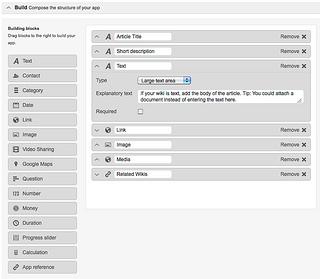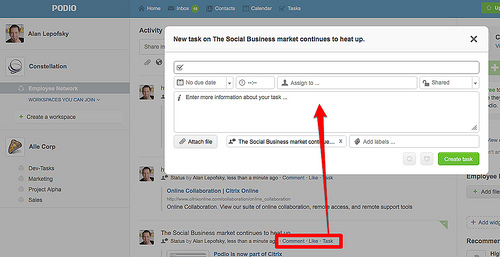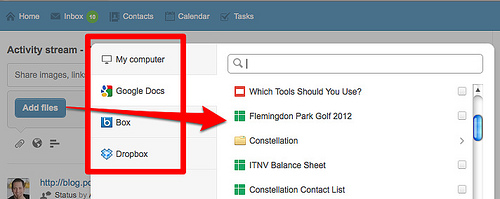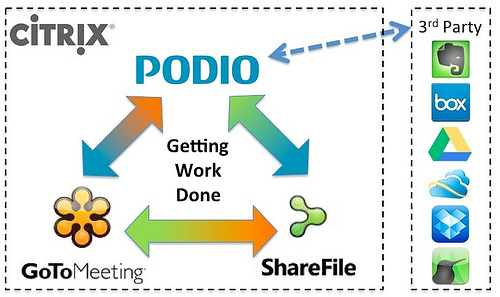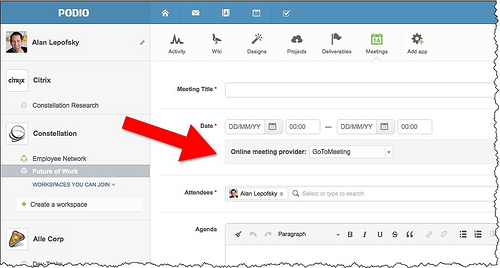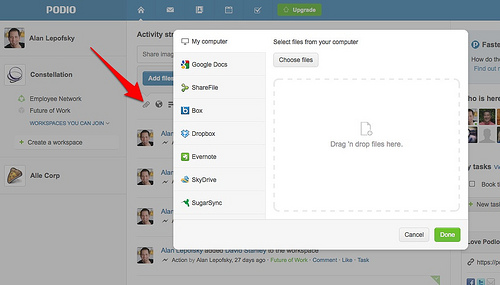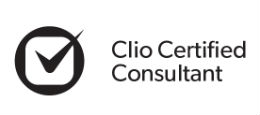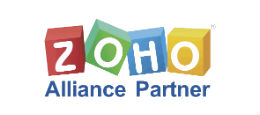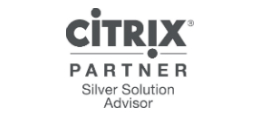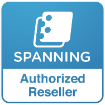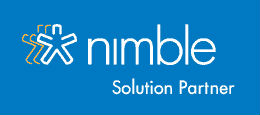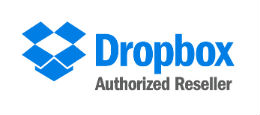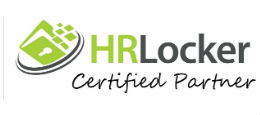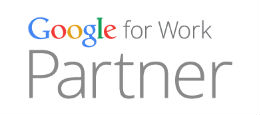Get work done with your co-workers and clients on a social work platform that you make your own. Work with any group of people inside a workspace and your entire company in your Employee Network.
|
Constellation Research analyst Alan Lepofsky described Podio yesterday as "what Lotus Notes should have evolved to be."
What do you get when you mix together web-conferencing, cloud based file sharing, collaboration workspaces, task/project management and social networking? Well, Citrix is certainly hoping it's a delicious recipe for the Future of Work, as today they announced the acquisition of Podio. Readers who follow my blog will recall that I've written about Podio several times in the past. They are (or were) a small startup ($4M in series A funding) with teams in Copenhagen and San Francisco, who develop a wonderful collaboration platform that I've often referred to as "What Lotus Notes should have evolved to be." Why I say that is that unlike most collaboration platforms that offer blogs, wikis, forums and other unstructured content tools, Podio is based on "applications" which use fields on forms that people fill in to create content and then that information is displayed in various types of views. Podio applications are created by simply drag and dropping fields onto the form, no specialized development skills are needed. This enables people to create applications on their own, without the involvement of the IT department. Podio also has an application store with hundreds of pre-built applications, so in many cases organizations won't need to build anything at all. |
|
|
Here is a quick look at some of the things that I think make Podio standout in the crowded Social Buisness/Collaboration space:
Structured Data As I mentioned above, Podio apps don't just have a single rich text field where you enter all your content. Instead you have structured field types which makes it much easier to quickly and consistently enter information. For example, you can have specific fields for names, dates, currency values, videos, maps and more. |
|
Task Management
It's easy to turn any object in the activity stream into a task. This helps people focus on getting actual work done, not just sharing status updated and links to other web sites. Podio (pronounced like podium) is one of those companies that just keeps impressing me. The problem is, they are hard to categorize because they are more of a platform for creating applications than a specific application themselves. You can use Podio for CRM, Project Management, Sales Tracking, or hundreds of other use-cases. Visit the Podio App Store for examples. Today Podio announced several improvements to their task capabilities, including repeats and reminders. |
|
|
Application Store
The Podio App Store provides hundreds of pre-build (yet still customizable) applications for dozens of use-cases including Sales, Marketing, Finance, HR, Project Management, CRM, Supply Chain and many many more. 3rd Party Integration Podio integrates with Box, Google Docs and Dropbox, which more connectors in the works. Podio differentiates itself from the sea of various "2.0" collaboration startups, by focusing on structured content rather than just generic collaboration tools like blogs, wikis, forums and status updates/streams. With Podio people can easily create "applications" (via a simple drag and drop UI) for things like CRM, expense reports, feature requests, travel forms, customer feedback or anything else that involves people filling in a form. Applications live inside workspaces, where you can define membership, see status updates, share a calendar and more. I've often called Podio "What Lotus Notes should have become." (see My Point of View after the video below) This week Podio announced integration with Google Apps, enabling customers to easily move information from email messages into Podio Workspaces. "We've developed what Google calls a 'Gmail Contextual Gadget' that shows up right below each message. It allows you to turn that message into a task, automatically bringing over the subject, body, and any attachments." - Ryan Nichols, VP of Apps at Podio Below is a short video that shows the integration between Podio and both GMail and GCalendar. Mobile Access The Podio applications you use on the web are also accessible on the iPhone and Android devices, with no additional development required. An iPad application is currently being developed. My Point of View This latest announcement of integration with Google Apps is a smart one. While many large enterprises still use traditional email systems from Microsoft and IBM, Podio knows their target audience matches the typical Google customer. With more than 4 million customers using Google Apps, Podio can now potentially reach a very large customer base. I believe Podio is one of the most important silicon valley startups to watch as we head into 2012. As "social software" shifts from general collaboration use-cases to being more focused on enhancing business processes, Podio is uniquely positioned to deliver useful business applications to cutomers. It's important to note that applications built via Podio's drag and drop web UI are also instantly available via mobile devices with no additional programming. |
|
|
|
Today Podio enhanced their collaboration platform with the addition of several new calendar related features. I've always been a firm believer that calendars are a vital component in helping both individuals and teams stay organized, and that organization is a critical component in getting work done.
Unlike most collaboration platforms, the Podio calendar does more than just display events (like team meetings) and tasks/todos. Instead, the calendar for each workspace can display a link to any application record that contains a date field. That means applications that contain date sensitive information (ex: sales tracking, project organizing, benefit enrollments, vacation planning, etc.) can now be easily viewed in a calendar format.
In addition to workspace calendars, Podio has also enhanced their personal calendar feature, by introducing an interesting new concept, a slider that enables people to control the granularity of the information they see. The slider allows people to choose from a range of options starting with personal tasks and meetings up to all the date related events in all the workspaces they are a member of. Of course this demos quite well in the video below, but I am concerned about how well this works for people who are active members of many workspaces. Will the display become too cluttered to read? I hope to see some additional filtering options in a future release. (ex: select which applications from which workspaces, which priority of tasks, etc.)
Finally, Podio has always done an excellent job of providing integration with the other platforms people use to get their work done. For example, you can share files that are stored in a variety of different tools like Box and Google Drive. Keeping with that tradition, Podio has made it simple to display your Podio events in either Google Calendar or Microsoft Exchange calendars. That means people don't need to leave the context of those tools to see all the events that will impact their day.
Unlike most collaboration platforms, the Podio calendar does more than just display events (like team meetings) and tasks/todos. Instead, the calendar for each workspace can display a link to any application record that contains a date field. That means applications that contain date sensitive information (ex: sales tracking, project organizing, benefit enrollments, vacation planning, etc.) can now be easily viewed in a calendar format.
In addition to workspace calendars, Podio has also enhanced their personal calendar feature, by introducing an interesting new concept, a slider that enables people to control the granularity of the information they see. The slider allows people to choose from a range of options starting with personal tasks and meetings up to all the date related events in all the workspaces they are a member of. Of course this demos quite well in the video below, but I am concerned about how well this works for people who are active members of many workspaces. Will the display become too cluttered to read? I hope to see some additional filtering options in a future release. (ex: select which applications from which workspaces, which priority of tasks, etc.)
Finally, Podio has always done an excellent job of providing integration with the other platforms people use to get their work done. For example, you can share files that are stored in a variety of different tools like Box and Google Drive. Keeping with that tradition, Podio has made it simple to display your Podio events in either Google Calendar or Microsoft Exchange calendars. That means people don't need to leave the context of those tools to see all the events that will impact their day.
Last week Citrix held their 7th annual Synergy conference at the Moscone Center in San Francisco with close to 7000 people in attendance. Many of the infrastructure products that Citrix sells ($2B+ revenue in 2011) are outside of my coverage area, but now that they are increasing their focus on providing software that helps people get work done, I was honoured to attend the event. Below are my thoughts around their collaboration portfolio which includes GoToMeeting, ShareFile and the recently acquired Podio.
It's How You Tell The Story
What impressed me the most during Synergy was not their products, but the way they talked about collaboration. Rarely during the keynotes or my 1:1 meetings with their executives did I hear talk of "social", and not once did anyone use the term "social business." There were no tales of how today's workforce is based on a more open culture of sharing, nor how a new set of tools/services is needed to help organizations change the way people work. Instead all of Citrix's messaging was around improving the processes that employees currently use to get their jobs done.
For example, think about a typical web-conference; a conversation begins in email or maybe chat and then an hour is scheduled to get everyone together to discuss and watch someone present slides. The problem with this workflow is that the information which led up to the meeting, the content produced during the meeting, the decisions made and follow up-items assigned, as well as everything that occurs after the meeting are not connected. Enter Podio, which provides collaborative workspaces where people can work together to create and share information and tasks. Add to that files stored in ShareFile (or other 3rd party file stores) and you have project workspaces, content and real-time web-conferencing combined. I think of this as the Citrix Collaboration Platform, which I've illustrated below.
It's How You Tell The Story
What impressed me the most during Synergy was not their products, but the way they talked about collaboration. Rarely during the keynotes or my 1:1 meetings with their executives did I hear talk of "social", and not once did anyone use the term "social business." There were no tales of how today's workforce is based on a more open culture of sharing, nor how a new set of tools/services is needed to help organizations change the way people work. Instead all of Citrix's messaging was around improving the processes that employees currently use to get their jobs done.
For example, think about a typical web-conference; a conversation begins in email or maybe chat and then an hour is scheduled to get everyone together to discuss and watch someone present slides. The problem with this workflow is that the information which led up to the meeting, the content produced during the meeting, the decisions made and follow up-items assigned, as well as everything that occurs after the meeting are not connected. Enter Podio, which provides collaborative workspaces where people can work together to create and share information and tasks. Add to that files stored in ShareFile (or other 3rd party file stores) and you have project workspaces, content and real-time web-conferencing combined. I think of this as the Citrix Collaboration Platform, which I've illustrated below.
While having a platform that combines these features is certainly useful, it is not unique to Citrix. Several other vendors including (alphabetically) Cisco Quad (WebEx), IBM SmartCloud (formerly LotusLive), Microsoft SharePoint (Lync), Oracle (Beehive) and Saba People Cloud (Centra) have similar offerings based on their collaboration and web-conferencing services. Each of these platforms has its strengths and weaknesses (including features, deployment options and pricing) but one of the things that sets Citrix apart is the Podio applications, which I cover in more detail below. Side note: Adobe Connect is now the only major enterprise web-conferencing service without an integrated collaboration platform, so I expect to see them making an acquisition soon.
There's A (Business) App For That
I've been a big fan of Podio since the moment I first discovered the quirky little Danish startup. While most "2.0" vendors were busy developing blogs, wikis and activity streams, Podio focused on creating a platform where people could easily build (or perhaps a better word is assemble) or download (from an integrated app store) business applications for things like HR, CRM, finance, meetings, etc. These apps do not need to be coded by developers. Instead, anyone can create one by simply drag and dropping fields onto a form (text, date, check boxes, status indicators, videos, maps, etc.), people then create pages based on these forms, and the completed forms are then displayed in views. Does this sound familiar? If so, you'll understand why I've been calling Podio "What Lotus Notes should have become." for almost two years now.
There are several things I find extremely useful about Podio apps, such as:
Getting Work Done
While many vendors are talking about "Adding social to core business process", that often just boils down to integration of events from one platform into the activity stream of another. To get real work done employees need to be able to create and engage with the people and content that contribute to their jobs. Podio apps are design to "be" core business processes, not just link to them. Also Podio apps have social features like commenting, liking, sharing and task assignment built right in, not added afterwards. Now add to that the integrated web-conferencing features of Citrix GoToMeeting, plus attachment storage from Citrix ShareFile (or other 3rd party file sharing tools) and you have a very powerful platform that employees can work together on to help achieve their business goals.
There's A (Business) App For That
I've been a big fan of Podio since the moment I first discovered the quirky little Danish startup. While most "2.0" vendors were busy developing blogs, wikis and activity streams, Podio focused on creating a platform where people could easily build (or perhaps a better word is assemble) or download (from an integrated app store) business applications for things like HR, CRM, finance, meetings, etc. These apps do not need to be coded by developers. Instead, anyone can create one by simply drag and dropping fields onto a form (text, date, check boxes, status indicators, videos, maps, etc.), people then create pages based on these forms, and the completed forms are then displayed in views. Does this sound familiar? If so, you'll understand why I've been calling Podio "What Lotus Notes should have become." for almost two years now.
There are several things I find extremely useful about Podio apps, such as:
- They provide structured content versus simply jumbling together all the information into a single field. For example, if you're taking meeting minutes you could have a field for names of attendees and additional fields for agenda, notes and follow-up items. Or a feature request form could have fields for customer name, date requested, details, priority, revenue implications and project status. Providing fields to input information is faster and more consistent that just using free flow text.
- Because of these fields, the views in Podio can be sorted and filtered to show just the information you want to see. For example, if you want to see all the feature requests with status "In Progress" that are from companies over 10,000 employees, a few simple clicks and the view will show you exactly what you're looking for.
- Views have built in reporting capabilities where you can calculate things like count, sum, max, min or average of (appropriate) fields. For example: In a CRM app, it's easy to quickly see the total revenue from of all the opportunities or you could just report on a subset based on any filters you wish to add.
- Task assignment/management features are built into the core of everything in Podio. Tasks can be generic or related to a specific workspace, application or even as granular as a specific page.
- Podio apps are accessible on Android and iPhones without any additional coding.
- Podio has been excellent at providing integration with other products such as Google Apps, Box, DropBox, Evernote and more.
Getting Work Done
While many vendors are talking about "Adding social to core business process", that often just boils down to integration of events from one platform into the activity stream of another. To get real work done employees need to be able to create and engage with the people and content that contribute to their jobs. Podio apps are design to "be" core business processes, not just link to them. Also Podio apps have social features like commenting, liking, sharing and task assignment built right in, not added afterwards. Now add to that the integrated web-conferencing features of Citrix GoToMeeting, plus attachment storage from Citrix ShareFile (or other 3rd party file sharing tools) and you have a very powerful platform that employees can work together on to help achieve their business goals.
When Your Benefits Are Your Curse
While I've mentioned several positive things above, reality is that the success of Citrix and Podio faces many challenges. With almost almost two decades of Lotus Notes experience behind me, I know first hand that marketing a platform that can be used in numerous ways is quite difficult. It's much easier to explain the benefits of specific applications like HR, CRM or ERP that it is to sell something that is "the Swiss Army knife of collaboration." Lotus Notes suffered from this as does Microsoft SharePoint today. But times have changed, and people are perhaps more accustomed to the "there's an app for that" philosophy today than they were a decade ago.
Similarly, while "anyone can create applications" sounds good in marketing material, this does not always work out so well in a corporate environment. Sure anyone drag and drop a few fields onto a form and call it an application. But designing a successful app also requires an understanding of workflow, user experience (UX) and user interface (UI) design. Without corporate standards for things like form layout and field naming conventions in place, rouge applications can turn up by the dozens. I assure you, providing people bad applications, or even just inconsistently designed applications can almost be as bad as not providing applications at all. I think there is a huge opportunity for growth in administration and developer tools for the Podio platform.
The Road Ahead
Putting GoToMeeting, Podio and ShareFile together is good starting point for Citrix as they look to provide their customers collaboration tools. Podio workspaces provide a way to turn GoToMeeting into more than just an occasional tool that people use to get together online. Now web-conferencing can become an integrated part of the workflows that people use as they collaborate via Podio applications. I'd like to see native chat added to the mix, enabling people to quickly get answers to questions, share links, etc. in a less formal manner than using the Podio activity streams or email. Today the integration between the 3 products is quite basic, but over time I expect to see a much more robust set of features evolve. To begin with, I'd like to see unified registration, log-on and directory (people and groups) features that span Podio, ShareFile and GoToMeeting.
Citrix provides the potential to elevate Podio from "niche collaboration product" to a major vendor in the collaboration market, as Citrix can supply Podio the resources to grow the product as well as a huge customer base to sell into. I hope to see several improvements in Podio's activity stream such as filtering (similar to what they provide in applications), embedded attachment viewers, tagging and hide/mute as well as a more robust text editor that allows control over fonts, tables, images and more. I'd also like to see more layout options for Podio forms.
While I don't expect to see an on-premises version appear, I do hope that restrictions such as GoToMeeting's 15 person limit are lifted, or else it will be difficult for Podio to grow beyond small departmental applications to supporting company wide business processes.
From everything I've seen and heard so far, I'm quite impressed by Citrix's vision to help employees get work done. It's what they have been doing for years with their desktop virtualization products and now I look forward to seeing how they do with collaboration.
For More Information
While I've mentioned several positive things above, reality is that the success of Citrix and Podio faces many challenges. With almost almost two decades of Lotus Notes experience behind me, I know first hand that marketing a platform that can be used in numerous ways is quite difficult. It's much easier to explain the benefits of specific applications like HR, CRM or ERP that it is to sell something that is "the Swiss Army knife of collaboration." Lotus Notes suffered from this as does Microsoft SharePoint today. But times have changed, and people are perhaps more accustomed to the "there's an app for that" philosophy today than they were a decade ago.
Similarly, while "anyone can create applications" sounds good in marketing material, this does not always work out so well in a corporate environment. Sure anyone drag and drop a few fields onto a form and call it an application. But designing a successful app also requires an understanding of workflow, user experience (UX) and user interface (UI) design. Without corporate standards for things like form layout and field naming conventions in place, rouge applications can turn up by the dozens. I assure you, providing people bad applications, or even just inconsistently designed applications can almost be as bad as not providing applications at all. I think there is a huge opportunity for growth in administration and developer tools for the Podio platform.
The Road Ahead
Putting GoToMeeting, Podio and ShareFile together is good starting point for Citrix as they look to provide their customers collaboration tools. Podio workspaces provide a way to turn GoToMeeting into more than just an occasional tool that people use to get together online. Now web-conferencing can become an integrated part of the workflows that people use as they collaborate via Podio applications. I'd like to see native chat added to the mix, enabling people to quickly get answers to questions, share links, etc. in a less formal manner than using the Podio activity streams or email. Today the integration between the 3 products is quite basic, but over time I expect to see a much more robust set of features evolve. To begin with, I'd like to see unified registration, log-on and directory (people and groups) features that span Podio, ShareFile and GoToMeeting.
Citrix provides the potential to elevate Podio from "niche collaboration product" to a major vendor in the collaboration market, as Citrix can supply Podio the resources to grow the product as well as a huge customer base to sell into. I hope to see several improvements in Podio's activity stream such as filtering (similar to what they provide in applications), embedded attachment viewers, tagging and hide/mute as well as a more robust text editor that allows control over fonts, tables, images and more. I'd also like to see more layout options for Podio forms.
While I don't expect to see an on-premises version appear, I do hope that restrictions such as GoToMeeting's 15 person limit are lifted, or else it will be difficult for Podio to grow beyond small departmental applications to supporting company wide business processes.
From everything I've seen and heard so far, I'm quite impressed by Citrix's vision to help employees get work done. It's what they have been doing for years with their desktop virtualization products and now I look forward to seeing how they do with collaboration.
For More Information
- All the announcements from the conferences are available here
- Citrix Debuts Podio, the Team-Based Collaboration Platform Designed for Today’s Mobile Workstyles
- Podio is the First Collaboration Platform to Support All Major Cloud File-Sharing Services
- New Enterprise-Class Features for Citrix ShareFile Offer Businesses More Flexibility and Control over Data Sharing and Storage
Social Task Management Vendors
Last updated Aug 6, 2012
* means tasks are part of a larger collaboration platform offering
Additional Reading:
Time/Task/Project frameworks: Getting_Things_Done , Kanban , Covey
Last updated Aug 6, 2012
* means tasks are part of a larger collaboration platform offering
- AgileZen
- Any.Do
- AtTask
- Asana
- Basecamp
- Bettermeans
- * Clearvale Tasks (by Broadvision)
- Cubevibe
- Do (by SalesForce)
- Fellowstream
- Flow
- Google Schemer
- Goshido
- * Huddle
- * IBM Connections Activities
- * Jive Software
- JoinCube
- Kerio
- MangoProjects
- Mavenlink
- MindGrow
- MindJet Connect (formerly CoHuman)
- Neudesic Pulse Tasks
- Offiria
- * Podio
- Producteev
- Rule
- Rypple Social Goals (by SalesForce)
- * Saba People Cloud Goals
- SAP Streamworks
- Siasto
- Socialcast Strides (by VMware)
- Sparqlight
- TeamBox
- TeamWork Live
- * Traction Teampage
- Trello
- Vantage
- Wrike
- Wunderkit
- WorkSimple
- Yodiz
- ZoHo Projects
Additional Reading:
Time/Task/Project frameworks: Getting_Things_Done , Kanban , Covey




